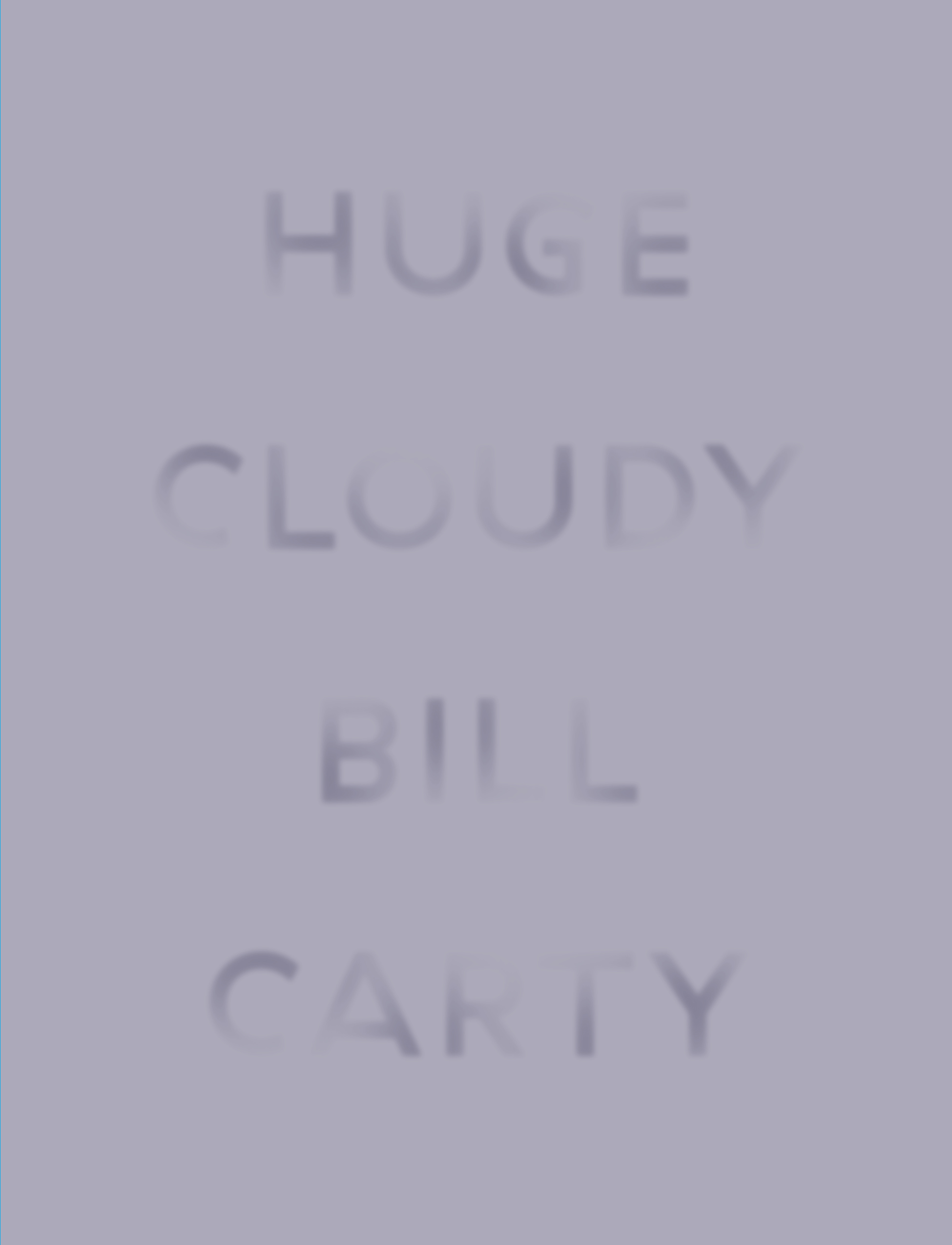Every silver lining has a cloud
The title poem prefacing Seattle poet Bill Carty's debut collection Huge Cloudy begins with a couplet that all but smacks the reader across the face: "Survived summer?/Prove it. Show the wound."
It takes some kind of guts to demand the reader to prove anything in the second line of the first poem in a book. It's enough to make a reader put the book down and point at it and say something like "who are you to ask me to prove anything?" If you're in a testy mood, you might demand to speak to Carty's manager before you realize you're yelling at a slender poetry collection.
But oh, that beautiful phrasing — the realization that every summer brings with it its own unique injuries. That's the kind of line that is so recognizable it makes a reader wince a bit, reflecting on their own brokenness. The pain makes the summer more enjoyable somehow, as Carty realizes: "A candle needs/that darkness/ to star in..." he writes next. By the time he reveals what his most joyful summer took from him at the end of the poem, you're drawn in. There's no choice.
Carty's poems often veer back and forth between a beautiful realization and a prickly barb tossed toward the reader. His poem "Happyish" darts between an idyllic summer garden scene — lemonade, celery, geraniums — and a wife's demand that her husband must shoot any cats who wander into the yard. It's a promise of violence that makes a reader wonder about the person they've entrusted with their attention. Is he a cat murderer, or is he just discussing an angry threat that's never even seriously considered? The answers don't seem forthcoming on the page. Carty wants you to struggle with it.
Huge Cloudy is a book that is rooted very particularly in place and time. When I interviewed him about the book launch a couple weeks ago, Carty admitted that the second section of the book, about his walks up and down Aurora Avenue, were added very late to Huge Cloudy — as in, over the past few months.
The book, Carty told me, "was four sections forever, and I couldn't get the balance right." The Aurora section of the book was added "like in January of this year," Carty said, and that addition "opened the book up." It's those walks down Aurora that give Huge Cloudy its vitality, its ability to dart back and forth between the welcoming and the off-putting. Carty muses on Emily Dickinson's letters and the fossil record and dead pets and the way tombstones on a hill resemble a crooked smile.
This is a walker's book, the kind of book written by someone who carves their way through the world one step at a time. Carty loves the fall, when he can peer through bare branches into windows to see what kind of television people watch when they think they're alone. He's always looking for the grotesque or the violent or the grotesque violence; he refuses to only see the beautiful or the stunning as he goes. You can't have the glory without the heartbreak.
Again and again, Carty flips over nobility to reveal its craven underbelly. He ascends to a god's eye view, only to notice how fragile everything looks from above. There's no achievement without a vulnerability built-in. He overhears someone saying that they developed a fear of heights as soon as they became a father. "Finally, a conversation/worth overhearing," Carty enthuses.
Big Cloudy also zig-zags between land and sea. He writes about the pain of pulling in empty fishing nets that are "mostly trash." Every so often, he pulls in some livelier prey with his nets:
...Water rushes from the deck.
cod slide across the metal..
Then the machete,
then fish heads buoyed in wake.
Carty isn't cultivating this friction in his work to shock his readers, or to come across as a bad boy of poetry. Instead, he has the eye of a particularly fine journalist. If he finds evidence that life is a joyful parade, he immediately must find countervaling arguments for the sake of perspective. Both arguments —the joyful summer and the hideous truth behind everyday life on the planet — are equally true. It depends on what you're looking for.
Make no mistake: these are high-quality poems. Carty reminds me of no one so much as a young Ed Skoog, which is a high compliment for any Seattle writer. But unlike Skoog, Carty's poems have a rawness, an edge that can be reignited at the wrong moment. These poems are beautiful and they are impeccably crafted, but they are also sprouting thorns, and those thorns will draw blood.
Paul is a co-founder of The Seattle Review of Books. He has written for The Progressive, Newsweek, Re/Code, the Utne Reader, the Los Angeles Times, the Seattle Times, the New York Observer, and many North American alternative weeklies. Paul has worked in the book business for two decades, starting as a bookseller (originally at Borders Books and Music, then at Boston’s grand old Brattle Bookshop and Seattle’s own Elliott Bay Book Company) and then becoming a literary critic. Formerly the books editor for the Stranger, Paul is now a fellow at Civic Ventures, a public policy incubator based out of Seattle.
Follow Paul Constant on Twitter: @paulconstant
Other recent reviews
Talk about the weather
-
Interpretative Guide to Western-Northwest Weather Forecasts
March 27, 2018
72 pages
Provided by publisherBuy on IndieBound
The man show
-
The Sexiest Man Alive
October 01, 2018
72 pages
Provided by publisherBuy online
Accidentally honest
-
The Shame of Losing
October 01, 2018
264 pages
Provided by authorBuy on IndieBound
